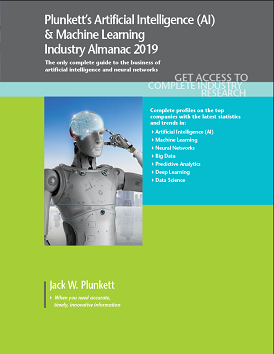Great news! We’ve launched the Artificial Intelligence research channel for subscribers to Plunkett Research Online. And, we’ve published the industry almanac version.
Plunkett’s Artificial Intelligence (AI) & Machine Learning Industry Almanac 2019
Artificial Intelligence, or simply “AI,” is being fueled by the ever-growing power of computers, networks and software. This power has increased to the extent that software can learn from experience, by constantly analyzing data and results until the software can make exacting predictions on its own, thanks to its accumulated knowledge. This process is often referred to as “machine learning.”
A vast variety of industries have put AI to work and continue to invest very heavily in development. Today, AI has synergies with many highly advanced technologies, such as virtual reality, factory automation, robotics, self-driving cars, speech recognition, the Internet of Things, and predictive analytics.
Clearly, AI is a revolutionary, very disruptive technology. Its effects on the economy, as well as the workplace, will be profound. The potential for employment disruption by AI is creating controversy similar to that surrounding the potential effect of robotics on jobs. (The robotics sector is becoming more and more closely linked to AI—each is a vital part of the global trend of “automation,” whether that automation is in the factory, online or in driverless vehicles.)
As AI becomes more advanced, its use is moving toward much more critical situations and processes. Over the mid-term, machines will not only be able to make human tasks more efficient and accurate, to a growing extent they will assist and cooperate in the completion of work that humans cannot easily accomplish on their own. (The word “Cobots,” short for collaborative robots, has already evolved to describe such synergy between humans and machines.) This enhancement of labor productivity can be of critical value in a world where nearly all major nations, from Europe to Asia and North America, are facing aging populations, modest birth rates and the looming prospect of labor shortages.
Among the greatest benefits to mankind will be AI’s ability to help solve many of society’s most pressing and critical problems—AI will help to increase data security, reduce online fraud, reduce physical crimes, lower the cost of some types of consumer products and services, improve health care outcomes and improve environmental quality.
At the same time, there are many observers who are concerned about the potential misuse of artificial intelligence. The greatest single concern may be the way that AI incentivizes companies to capture more and more personal data about people and their individual actions. Since AI becomes more powerful as the size of a data pool grows, AI-driven firms, such as social media and advertising platforms, are capturing ever-greater amounts of personal dataThere is always the potential for significant abuse. This growing pool of personal data will also become even more appealing to hackers and criminals.
Cloud computing, ultra-fast 5G wireless networks and the Internet of Things will work hand-in-hand with AI and machine learning. This will be a great advantage to some firms. At the same time, ethical and privacy concerns may drive a new level of regulatory control by governments worldwide.

Available to Plunkett Research Online subscribers.
See more information about the online edition here.
Also available in Almanac Editions.
Publication Date: January 2019 | Price: $379.99
Printed ISBN: 978-1-62831-516-5
eBook ISBN: 978-1-62831-841-8
See the complete listings of book contents and details here.

